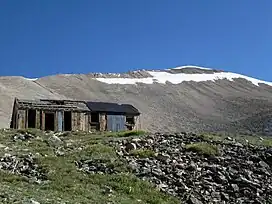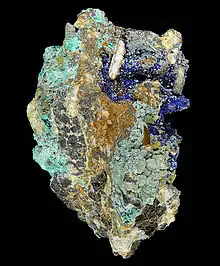Mount Sherman
Mount Sherman is a high mountain summit in the Mosquito Range of the Rocky Mountains of North America. The 14,043-foot (4,280 m) fourteener is located 6.8 miles (11.0 km) east by south (bearing 103°) of the City of Leadville, Colorado, United States, on the drainage divide separating Lake County from Park County.[1][2][3] The mountain was named in honor of General William Tecumseh Sherman.[5]
| Mount Sherman | |
|---|---|
 | |
| Highest point | |
| Elevation | 14,043 ft (4,280 m)[1][2] |
| Prominence | 850 ft (259 m)[2] |
| Isolation | 8.06 mi (12.97 km)[2] |
| Listing | Colorado Fourteener 45th |
| Coordinates | 39°13′30″N 106°10′11″W[3] |
| Geography | |
 Mount Sherman | |
| Location | Lake and Park counties, Colorado, United States[3] |
| Parent range | Mosquito Range[2] |
| Topo map | USGS 7.5' topographic map Mount Sherman, Colorado[3] |
| Climbing | |
| Easiest route | Southwest Ridge: Hike, class 2[4] |
Mountain
Mount Sherman is one of the most nondescript of the fourteeners, and one of the easiest to climb;[6] it is recommended as a beginner fourteener. It is also the only fourteener that has had a successful aircraft landing on its summit.[7]
Climate
| Climate data for Mount Sherman 39.2284 N, 106.1687 W, Elevation: 13,780 ft (4,200 m) (1991–2020 normals) | |||||||||||||
|---|---|---|---|---|---|---|---|---|---|---|---|---|---|
| Month | Jan | Feb | Mar | Apr | May | Jun | Jul | Aug | Sep | Oct | Nov | Dec | Year |
| Average high °F (°C) | 19.1 (−7.2) |
18.0 (−7.8) |
24.4 (−4.2) |
31.2 (−0.4) |
39.8 (4.3) |
50.8 (10.4) |
56.8 (13.8) |
54.5 (12.5) |
48.4 (9.1) |
37.4 (3.0) |
25.7 (−3.5) |
19.4 (−7.0) |
35.5 (1.9) |
| Daily mean °F (°C) | 8.4 (−13.1) |
7.3 (−13.7) |
12.7 (−10.7) |
18.6 (−7.4) |
27.4 (−2.6) |
37.4 (3.0) |
43.6 (6.4) |
41.9 (5.5) |
35.6 (2.0) |
25.5 (−3.6) |
15.5 (−9.2) |
8.9 (−12.8) |
23.6 (−4.7) |
| Average low °F (°C) | −2.3 (−19.1) |
−3.4 (−19.7) |
0.9 (−17.3) |
5.9 (−14.5) |
15.0 (−9.4) |
23.9 (−4.5) |
30.3 (−0.9) |
29.3 (−1.5) |
22.8 (−5.1) |
13.6 (−10.2) |
5.2 (−14.9) |
−1.6 (−18.7) |
11.6 (−11.3) |
| Average precipitation inches (mm) | 3.16 (80) |
3.11 (79) |
3.55 (90) |
4.20 (107) |
2.95 (75) |
1.56 (40) |
2.93 (74) |
3.21 (82) |
2.42 (61) |
2.39 (61) |
2.92 (74) |
2.95 (75) |
35.35 (898) |
| Source: PRISM Climate Group[8] | |||||||||||||
Sherman Mine
The Sherman mine, located in upper Iowa Gulch at and above 12,200 ft. on the west flank of Mt. Sherman, produced over 10 million ounces of silver, mostly between 1968 and 1982, with a value of over $300 million at 2010 prices. The Sherman silver-lead-zinc deposit is hosted in dolomites of the Early Mississippian Leadville Formation. Mineralization is within an integrated cavern system that developed in these carbonate rocks in Late Mississippian time.[9] Pb-Zn-Ag mineralization was emplaced into the old cave system at about 272 ± 18 Ma, during the Early Permian period.[10]
Secondary ore minerals from the Sherman mine are popular with mineral collectors.[11] The prominent ruins of the historic buildings and structures of the Hilltop Mine (above the more recent Sherman mine workings) are often visited and photographed by hikers and mountaineers.


References
- The elevation of Mount Sherman includes an adjustment of +2.029 m (+6.66 ft) from NGVD 29 to NAVD 88.
- "Mount Sherman, Colorado". Peakbagger.com. Retrieved October 21, 2014.
- "Mount Sherman". Geographic Names Information System. United States Geological Survey, United States Department of the Interior. Retrieved October 21, 2014.
- "Mt. Sherman Routes". 14ers.com.
- Dziezynski, James (1 August 2012). Best Summit Hikes in Colorado: An Opinionated Guide to 50+ Ascents of Classic and Little-Known Peaks from 8,144 to 14,433 Feet. Wilderness Press. p. 158. ISBN 978-0-89997-713-3.
- "Easiest 14er Routes". 14ers.com. Archived from the original on 2014-02-09. Retrieved 2014-02-13.
- Louis W. Dawson II, Dawson's Guide to Colorado's Fourteeners, Volume 1, Blue Clover Press, 1994, ISBN 0-9628867-1-8
- "PRISM Climate Group, Oregon State University". PRISM Climate Group, Oregon State University. Retrieved October 10, 2023.
To find the table data on the PRISM website, start by clicking Coordinates (under Location); copy Latitude and Longitude figures from top of table; click Zoom to location; click Precipitation, Minimum temp, Mean temp, Maximum temp; click 30-year normals, 1991-2020; click 800m; click Retrieve Time Series button.
- R. Mark Maslyn, Mineralized Late-Mississippian Paleokarst Features and Paleogeography in the Leadville, Colorado Area. 1996, National Speleological Society Convention Guidebook. Full text
- D. T. A. Symons, M. T. Lewchuk et al., Age of the Sherman-Type Zn-Pb-Ag Deposits, Mosquito Range,Colorado. Economic Geology; November 2000; v. 95; no. 7; p. 1489-1504; doi:10.2113/gsecongeo.95.7.1489. Abstract
- Sherman mine data and photos at Mindat.org